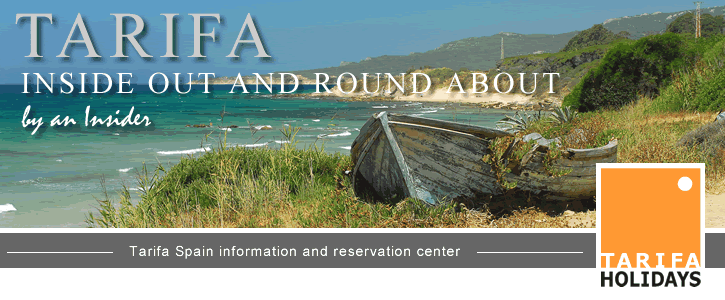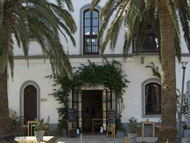
About
Zoe
the author of Tarifa Inside Out and Round About
Interview by Simone Kane - Editor for La Luz Magazine
Zoë Ouwehand-Reid has always been driven. At seven, she won a stick of Rock on England's Clacton Pier, for explaining what she hoped be when she grew up.
"I wanted to be a police officer, marry a foreigner and travel," she recalls. "I achieved the latter two and I taught for a while in Yugoslavia and the Sudan, which involved a sort of policing, so I'm not dissapointed."
Zoë and her Dutch husband, Floris, spent a lot of time moving around - first out of necessity , later by choice. "I spent my early adult life working in Yugoslavia as an English teacher, then in Egypt for a major oil company.
After I married we went on travelling as expatriates - the Congo, the Sudan, Belgium... at one point I lived in 7 countries in 14 years," she says.
Later, nearing retirement, the couple were deliberating about where to settle. It made sense to put down roots in Spain. The couple's eldest son, Paul, had lived in Tarifa since 1986, on the back of the windsurfing boom, and had set up a windsurf supply business with a childhood friend. "We came to see what he was doing. He was working from a tiny office and living in a grotty apartment. But he was happy," says Zoë.
"Tarifa then wasn't like it is today - it was much more run down. Over numerous visits, we developed a love-hate relationship with the place."Their youngest son, Jeroen, was studying at Seville University at the time. "Our family was very Spain-oriented," says Zoë.
An eye on their future, she and Floris decided to buy a ruined house adjoining the walls of old Tarifa. "It was a wreck inhabited by rats," says Zoë. "But Floris, a good sailor, loved the rooftop view of the boats in the harbour. And I couldn't resist the vista of Africa - my spiritual home."
The unique site of the property - with the city walls running through it -meant it took three years to get approval from the Bellas Artes de Cádiz (Similar to the National Trust) for the reform and two further years to execute their plan.
In 1989, Floris reached retirement, but Zoë had a successful recruitment and selection business in Holland. "I still loved running my company," says Zoë. "I had a staff of 17 women and one man. People would say,'I have a woman on my team,' and I'd say, 'Well, I have a man on mine.' "
While she worked Floris went university and once he graduated, she sold up. They divided their time between Spain, Holland and Francewhile the reforms continued and finally decided to move to Tarifa permanently - even Zoë had grown to love it.
By December 1996, the house was finished and Floris and Zoë had paid the last bill. "We were looking forward to our Christmas break in Holland," she says. But while they were there, Floris found a lump in his abdomen. "He assumed it was the results of too many press-ups - even at 71 he kept fit," says Zoë. But liver cancer was diagnosed and sadly Floris died within 6 months. He and Zoë had not slept one night in their house.
"Back in Tarifa," says Zoë. "I stood with my sons in my new kitchen, holding the urn containing my husband's ashes, stared at my view of Africa and wondered what to do... "We scattered Floris's ashes in the Strait of Gibraltar, which seemed appropriate," says Zoë. "But I was ready to throw in the towel. Paul was living in Holland, but when he came back to check on me, he said, 'Mum, I'm coming back. I belong here.' "
After Floris died, Zoë spent seven weeks in South Africa with a friend. While there, she came across an electric heating panel that she felt would be perfect for Tarifa's damp winters. Businesswoman that she is, she visited the factory and formed an affinity with the owner, after asking about a notice that said "a percentage of proceeds go to cancer research". They established they had both recently lost someone and their shared experience resulted in Zoë leaving with a gift of two panels. " I wanted to help the manufacturer whom I'd met," she says, "but it was Paul who saw the potential to import and sell the panels, so I was happy to pas it over to him. Initially I was known as 'the travelling slaeslady' because I always had a heater in my car," says Zoë. In a typical example of this family's co-operation, Paul took on the heaters and made a success of it. (www.econoheat-med.com)
"Our family has a saying," says Zoë:'Look for the opportunities in the problems, not the problems in the opportunities.' We try to live by it, although at times it's been hard."
It's Zo¨'s determination to take on life's challengesthat has pulled her through those times, as well as the ability to spot an opportunity. When the ruin next door came up for sale, her sons helped her purchase it, although she funded the project from the sale of her business. "I prefer to put my money into bricks," she says. The creation of Dar Cilla from the ruin was another family effort. Paul managed the project and Zoë was free to indulge in the decoration. On regular shopping trips to Morocco, she picked up beautiful pieces, as well as ideas.
The result is a group of seven stylish self-catering apartments formed around an internal patio (dar is the Moroccan name for a group of suites around a patio; while cilla means grain store).
"I wrote a mission statement," says Zoë. "First, I wanted to add a social dimension to my life. Second, I hoped to create a vacation home for family and friends, but giving them independence. I like to mingle with my guests, without being intrusive. I have been asked to join people for a glass of wine on the terrace and I've been known to cook a Moroccan supper for guests."
Guesthouse Dar Cilla opened in May 2003, but most guests have come via word of mouth. Most importantly, the two interconnecting labyrinthine buildings that make up Zoë's house and Dar Cilla are still a magnet for her family.
Looking at Zoë today, with Tarifa's rooftops behind her and her beloved Africa in the distance, you wouldn't guess what she'd been through. She looks glamerous and exudes positive energy, despite only recently having emerged from a difficult period. No-one could say Zoë allowed events to dictate her life. Instead, she has created a new life for herself.
![]() From
about Zoë to the first page of Tarifa Inside Out by an insider
From
about Zoë to the first page of Tarifa Inside Out by an insider
Zoë's guest house Dar Cilla
 Zoë
is the owner of Guesthouse Dar Cilla which is unique of its sort in Tarifa.
It is located on the outskirts of the old town within the old 12th century
walls. 'Dar' is an Arabic word for a town house in which a series of suites
are grouped around a central courtyard. Each suite is fully independent,
but there is a pleasant air of 'sociability' and you will meet Zoë
and fellow guests on the roof terrace over a glass of wine.
Zoë
is the owner of Guesthouse Dar Cilla which is unique of its sort in Tarifa.
It is located on the outskirts of the old town within the old 12th century
walls. 'Dar' is an Arabic word for a town house in which a series of suites
are grouped around a central courtyard. Each suite is fully independent,
but there is a pleasant air of 'sociability' and you will meet Zoë
and fellow guests on the roof terrace over a glass of wine.